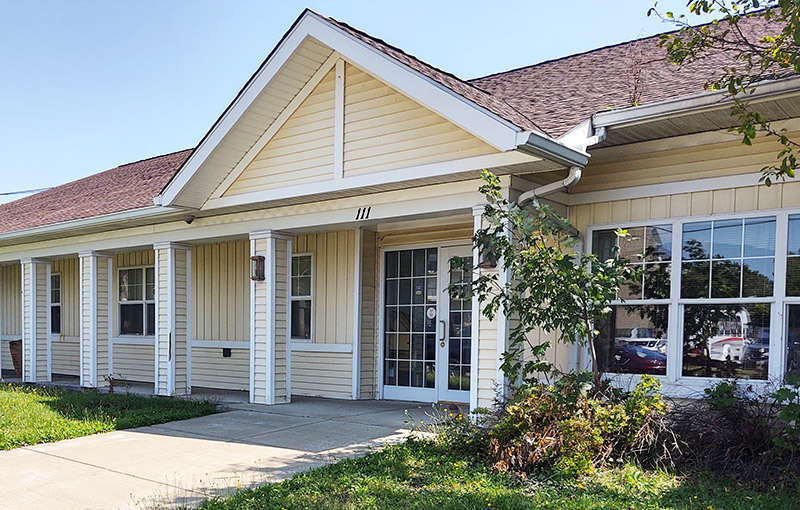Recently, Recovery Options Made Easy, in partnership with Spectrum Health and Human Services and Western New York Independent Living Center’s Mental Health Peer Connection, has developed a new model of crisis response and hospital diversion services. This center is the first of its kind in New York State and incorporates multiple mental health crisis services under one roof. This innovative model was conceived of by the late Dr. Kirsten Vincent of Recovery Options in response to the growing need for effective person-centered mental health crisis response services that provide an alternative to hospital emergency room presentations. Dr. Vincent developed the first mental health crisis respite in Erie County which is still successfully operating. Several years ago, Dr. Vincent recognized that additional levels of service were necessary and that having multiple services available in one location would better support those in crisis. In response to this need, the Respite and Recovery Center concept was developed. Although the Respite and Recovery Center was in development before the COVID-19 pandemic, the need for easily accessible crisis response services has only grown throughout the pandemic. The center aims to provide an inclusive continuum of services to meet the needs of those experiencing a mental health crisis while simultaneously reducing the burden on the hospital systems.

Respite and Recovery Center in Erie County New York
The Respite and Recovery Center will include the Renewal Center, an after-hours peer-run engagement center with nursing supports to run in cooperation with Western New York Independent Living Center’s Mental Health Peer Connection; a behavioral health urgent care satellite run by Spectrum Health & Human Services; the Refreshing Water Respite, a peer-run short-term crisis respite providing 24-hour peer support for up to 28 days; and the Restful Rivers Intensive Respite, a peer-run intensive crisis respite providing 24-hour peer support, nursing support, and psychiatric support for up to 28 days both operated by Recovery Options Made Easy. By co-locating multiple levels of care under one roof, individuals experiencing a crisis will no longer need to contact multiple programs or present at multiple sites to receive the support that they need. Individuals can present at any program in the model and be offered an array of choices to meet their current needs. Additionally, the Intensive Crisis Respite model will be the first of its kind in NYS and fill an existing gap in the county continuum of mental health crisis services by offering a 24-hour solution to those who do not meet behavioral health inpatient admission criteria but need more supports than a short-term crisis respite can provide. This will include 24-hour access to psychiatry and nursing supports.
Recovery Options recognizes the difficulties faced by individuals and their families in seeking support during a mental health crisis. Many of us have family or friends who have struggled with their mental health and did not know where to turn. The system can be confusing and overwhelming to those who are not familiar with navigating it. This often leads individuals to seek help from hospital emergency departments because they are open and easily accessible. However, this practice can lead to overcrowding in emergency departments, an increase in healthcare costs, and re-traumatization of the individual seeking treatment. Recovery Options believes that hope does not have to mean hospitalization and has developed the Kirsten Vincent Respite and Recovery Center to provide people in need with alternative voluntary options that can meet a variety of their needs during a crisis while maintaining their independence. By combining clinical and peer-based approaches for mental health crisis stabilization, the center will be able to offer the most effective options to meet each individual’s current needs while simultaneously working with individuals to engage in crisis planning to help avoid or better manage future crises. These services are a highly cost-effective and trauma-informed approach to mental health crisis stabilization that ultimately aids in reducing the overall burden on the hospital systems and the taxpayers while improving outcomes for those in crisis.
As a peer-run organization, Recovery Options has a strong track record of providing peer-run crisis respite services in Erie County. These services boast a 95% hospital diversion rate over the last five years. Growing options for respite support and adding intensive respite services will increase the agency’s ability to provide robust, high-quality services to residents of Erie County. Now more than ever, people need support for their mental health needs. Many individuals experiencing a mental health crisis need more support than the existing respite options in the county can provide, but do not meet admission criteria for inpatient hospital care. The Intensive Crisis Respite model will fill this gap and provide a much-needed community resource to help those individuals manage their crisis and successfully move forward in their recovery while still offering 24-hour support in a peer-run environment.
Shannon Higbee is the Chief Executive Officer for Recovery Options Made Easy. To learn more, visit recoveryoptionsny.org.




